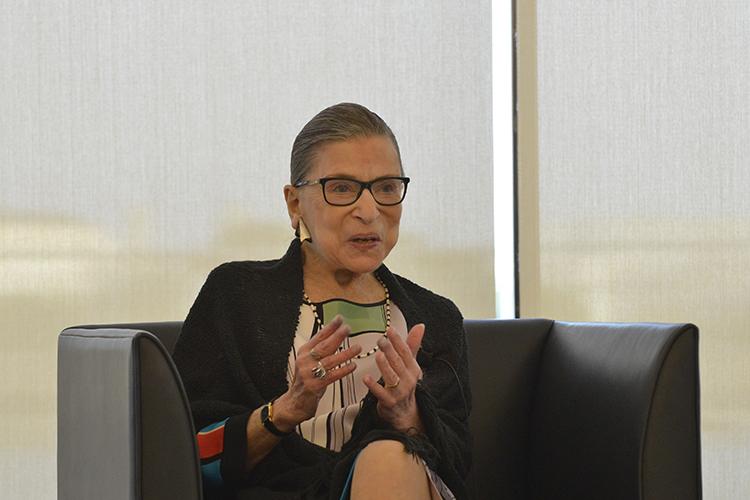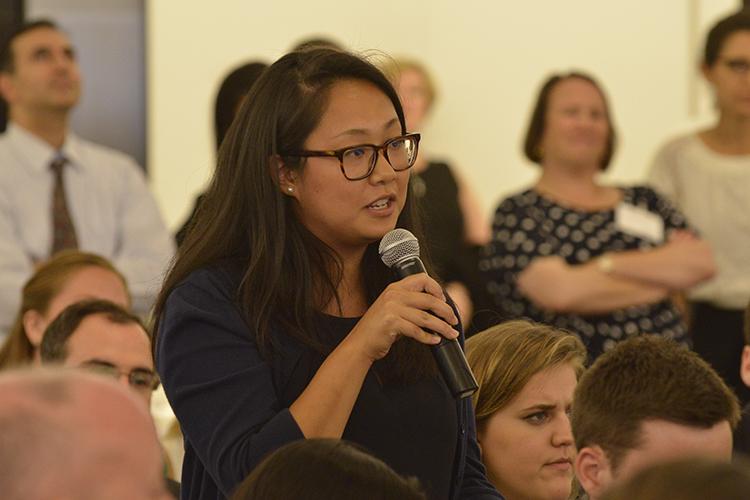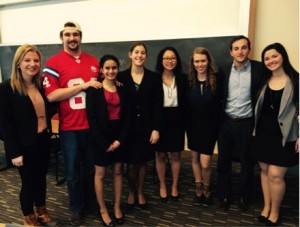This semester I have had the opportunity to study in Copenhagen with the Danish Institute for Study Abroad (D.I.S). While I quickly came to love Copenhagen in part for its ubiquitous tranquility, the shootings this past February served as a reminder of what is at stake in this time of “lone wolf” terror attacks.
On our first day of orientation, all students in D.I.S. gathered in a large theater as we listened to a speech delivered by the Executive Director. One of the main points of her speech was that Danes tend to view themselves as a tribe, and this tribe has built a society founded upon trust of one another. Mothers often leave their children in strollers unattended outside of stores while they go in to shop. They trust that strangers will ensure the baby is left unharmed. When our professors have spoken to us about traveling to other cities, they warn us to be more aware of our surroundings because other cities “aren’t like Copenhagen.” At no point in Copenhagen had I ever felt unsafe due to typical crime, let alone terrorism.
Before I left for Denmark this January, I knew its history with political cartoons made it a potential target for attacks like the shootings in Paris.
In 2005, the Danish magazine Jyllands-Posten published a dozen cartoons portraying the prophet Muhammad in an editorial about self-censorship in the conversation about Islam. The controversial cartoons sparked protests throughout the Muslim world. Two years later, Danish artist Lars Vilks also depicted the prophet Muhammad in a cartoon published in a Swedish newspaper, leading to violent demonstrations and calls for his assassination. Vilks had stayed out of the headlines for many years until this past February when his safety and Copenhagen’s security were put in jeopardy.
On the day of the attacks, I was eating dinner with some student friends when we started receiving messages from friends and family asking us if everything was all right. We quickly searched for the news on our cell phones and read about a targeted at an event attended by Lars Vilks. We were all surprised and saddened by the news but we decided it would not stop us from going out that night to celebrate a friend’s birthday. While many of us had concerns about another attack, we tried to be like Danes, who lined the streets unconcerned about the day’s incident.
At about 1:00 AM we learned that there had been a second shooting at a synagogue in Copenhagen and that the manhunt for the gunman was putting the city on lockdown. We quickly rallied all of our friends out of the bar we were in and hauled the first cabs we could find.
On our way home we saw a Copenhagen we never thought we would see. Police cars were everywhere and Nørreport station – our local metro station – was shut down. As we crossed into our neighborhood of Nørrebro a policeman stopped us at a checkpoint to look inside our cab. I had never even seen a Danish policeman before. The city that is characterized by its open and safe nature now felt like a city under siege.
Once we got into our dorm we turned on the main Danish news station while our residential assistant translated what the reporter in the streets was saying. But the reporter’s words meant less to us than the picture on the television screen. The reporter was standing in the street adjacent to where we take classes. We realized that the synagogue was the one located just two minutes from our school – the same synagogue that a few friends and I were told to visit just the night before. The proximity and context of the attacks turned what many viewed as a CNN spectacle into a strikingly personal moment in our adopted city.
With almost two months having past since the shootings, Copenhagen feels exactly how it did when I first arrived. I infrequently see police officers and Danes seem unfazed. Two days after the shootings, I was touched to visit the synagogue where the shooting occurred to see the entire street lined with bouquets of flowers and Israeli flags placed alongside those of Denmark.

A Danish police officer standing guard outside Copenhagen’s Great Synagogue, one of the sites of February’s terrorist attacks.
Yet I wonder if the greatest changes are still to come. I live in the neighborhood of Nørrebro, which is known for being home to much of Denmark’s Muslim population. At the bus stop you see the intersection of modern Danish society: quintessential looking Danes with blonde hair, dressed in stylish (mostly black) clothes, alongside Muslim women wearing headscarves. Denmark is still a largely homogeneous society but the makeup of its population is beginning to change, like much of the rest of Europe.
Many were not surprised to hear that the gunman from the attacks was Muslim. However, many were somewhat surprised to know that he was not from the Middle East – he was from Denmark, he was a Dane. He was shot outside his home in Nørrebro.
I question how this attack will change the way Denmark treats its Muslim population in the long run. Xenophobic, Islamophobic parties are on the rise throughout Europe, and now Denmark’s own version – the Danish People’s Party – appears to be benefitting politically from these attacks. Europe of course has a checkered history with its treatment of minority groups, but Denmark has prided itself in how it has a legacy of being an outlier. The classic example is how Denmark’s King Christian X smuggled the vast majority of Jewish Danes into neutral Sweden during World War II when Denmark was under Nazi occupation. To this day, Danes are proud of this accomplishment.
My hope is that Danes continue to respect their Muslim immigrants and citizens because the only way to integrate any group into a society is to make them feel at home. Antagonizing Muslims in the press or in personal interactions will only serve to deepen cultural divides, and further isolate young Muslims from feeling Danish.
One of the few facts many people know about Denmark is that it is consistently rated the happiest country in the world. Yet few people probably know that it also ranks as one of the most trusting nations – a title that reveals the social capital supporting the beloved Danish welfare state.
In this age of ISIS and homegrown terrorism, even the safest and best-prepared countries can be attacked. Radicalized individuals could have grown up in the most supportive neighborhoods and in the most tolerant societies, but they still may be drawn to the lure of a modern day crusade. I do not believe you can kill this kind of extremism with kindness.
However, we have the capability of shaping our outlook on the time in which we live. We are not living in a time of East vs. West. If we tell ourselves that, then the terror groups have manipulated us to see their dichotomous worldview. Western societies need to come down against explicit and implicit anti-Islamic rhetoric, because the more Muslims are antagonized, the more we begin to sound like the hateful groups we are fighting. Any party that rails against minority groups is unfit to govern.
These attacks have caused Danes to rally around their social and political beliefs in freedom of speech and expression. This past month Lars Vilks received an award from the right-wing Danish Free Press Society for his courage shown in the aftermath of his cartoon’s publishing. Yet Vilks should not just be used a figurehead for the freedom to freely antagonize other groups. Nor should Danes be mobilized by pointing fingers at Danish Muslims for issues in Danish society. With the freedom to speak out with reactionary impulses comes the freedom to be a voice for rational responses and tolerance. Problems are solved with solutions, not blame. If Danes truly believe the pen is more powerful than the sword, then the pen must be used to protect its society of trust, rather than allowing the right to rewrite who is deserving of this trust.
In response to the shootings, Denmark’s government has increased spending on security and intelligence services to try and thwart future attacks. This is the easy response. The more difficult response is for Danes to continue to trust all Danes, regardless of their ethnicity or religion.
Danish society thrives on its culture of trust. This trust must continue to include all communities living in Denmark. Any harboring of mistrust for any community in Denmark erodes the nation’s central value of putting faith in one another. Any leaders or parties who promise to “restore” or “preserve” traditional Danish values by singling out certain groups are accomplishing the exact opposite. If they succeed in making Danes mistrust fellow Danes, then they have allowed terrorism to take away one of the most laudable and enduring elements of Danish society.
Danes have always liked to walk to the beat of their own drum, and this path has led to peace and prosperity. I hope Denmark continues to do so by avoiding the rising trend of Islamophobia seen in France, the United Kingdom, and elsewhere throughout Europe. I call upon all Danes to continue to speak freely and trust fervently to prove Denmark’s reputation as a proud outlier.









